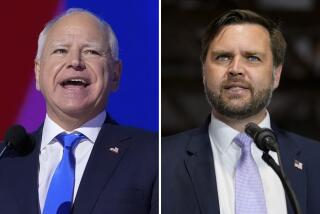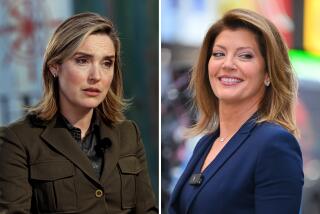NBC Breaks the Rules for Debate : Television: Tom Brokaw will moderate the first nationally broadcast forum of the 1992 presidential election season Sunday using a new format. His objective: to elicit spontaneity.
- Share via
NEW YORK — When NBC News broadcasts the first nationally televised debate of the 1992 presidential election season Sunday, there won’t be any live audience or fancy panel of crack inquisitors.
Instead, NBC will hold the affair in the studio at its Washington bureau, with anchor Tom Brokaw moderating, using a format with virtually no rules.
The objective is to elicit perhaps a few genuine, spontaneous moments.
“My hope is to make this like a spontaneous dinner-table conversation,” Brokaw said this week, as he plotted questions on 3-by-5 note cards to keep in his pockets. “This is not the dawning of a new age . . . but I hope to get beyond their chest-thumping.”
To some degree, NBC’s approach will test some of the ideas that all four of the national news networks jointly proposed for debates in 1992’s general election campaign. That proposal also removes the panel of questioners, the live audience and rigid rules, and is aimed at making the candidates confront each other as much as possible. Ultimately, whether such a format is used will depend on whether the two party nominees agree to it.
Because Sunday’s Democratic debate will involve six candidates, frank confrontations are less likely and perhaps less appropriate.
Also, NBC has dropped a device it used during the primary campaign four years ago in which candidates were asked to question each other.
“What happened is they asked these softballs,” said William O. Wheatley, director of political coverage for NBC.
Wheatley said the decision to forgo an audience Sunday was based in part on “instances in which the live-audience concept was abused, in which there was organized applause, and we are on record for the presidential debates saying we don’t want that.”
The only rules are that each candidate will be asked to try to limit his answer to each question to one minute--”though that will be loose,” Brokaw said--and that each candidate will have a brief closing statement.
The debate will last 90 minutes, with no commercial interruptions. In Southern California, it will be seen on a tape-delayed basis at 6:30 p.m. on KNBC Channel 4, KMIR Channel 36 and KNSD Channel 39.
No panel of questioners is being used, Wheatley said, because “if you had reporters asking questions it would be more like a formal press conference.”
Much of the nature of the debate will depend on Brokaw, who is digesting a prepared briefing book on the candidates and their positions and paring down a long list of suggested questions offered by various NBC correspondents and producers.
The questions will likely focus more on domestic issues than foreign, Brokaw predicted, in part because he believes those issues yield answers that reveal more about the character and philosophy of candidates than foreign policy.
“I think (character) comes out less in talking about the Soviet Union probably than it does in talking about health care, the homeless, AIDS, productivity,” he said.
Similarly, Wheatley is especially interested in trying to get at the leadership qualities of the candidates. One question he has suggested asks what level of sacrifice each candidate would expect from the nation to solve its long-term problems.
Whether that inquiry makes it onto one of Brokaw’s note cards and then into the debate is up to the anchor.
Brokaw joked, “The real question you want to ask to find out about the character of a person is, ‘Do you know the birthday of your children?’ ”
He added, “My own judgment is that (the character of the candidates) comes through in 90 minutes in how they answer questions about issues.”
One of the logistic headaches of sponsoring the debate, Wheatley said, is explaining to lesser-known candidates--from former Minnesota Sen. Eugene McCarthy to former Irvine Mayor Larry Agran--that they cannot participate.
“Did you know,” Wheatley said, “that there are 122 formally declared candidates for President?”
Only six will be on NBC Sunday:
* Former Sen. Paul Tsongas of Massachusetts.
* Sen. Bob Kerrey of Nebraska.
* Sen. Tom Harkin of Iowa.
* Gov. Bill Clinton of Arkansas.
* Former Gov. Edmund G. (Jerry) Brown Jr. of California.
* Gov. L. Douglas Wilder of Virginia.
More to Read
Get the L.A. Times Politics newsletter
Deeply reported insights into legislation, politics and policy from Sacramento, Washington and beyond. In your inbox twice per week.
You may occasionally receive promotional content from the Los Angeles Times.










